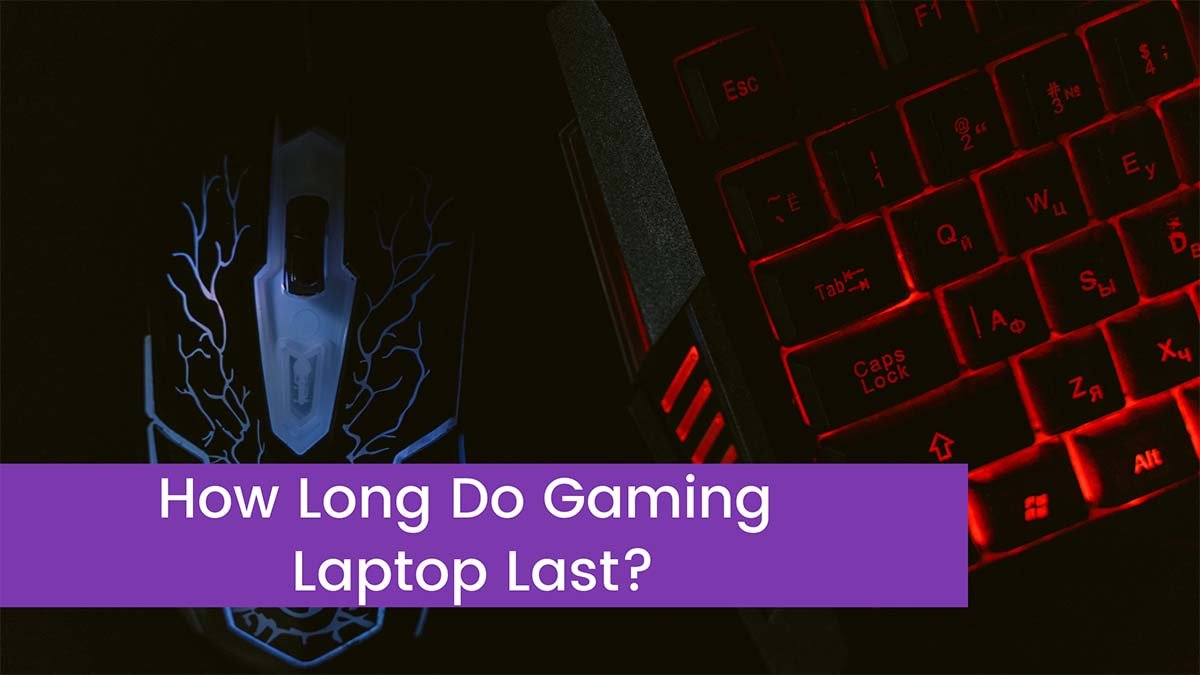Most mid-range notebook computers will last 3 to 4 years, but a good mid-range gaming laptop should survive 4 to 5 years with ease, exceptionally if adequately cared for.
Due to the more robust components, a high-end gaming laptop could last six years or more, so while there will be some variation, you should anticipate your gaming laptop to survive a long time, though not as long as desktop machines.
Laptops can survive longer than this, though, especially if you make some critical upgrades in the appropriate locations, but we’ll get into that later.
In general, the longevity of your device is determined by several factors, including its componentry, how well it is maintained, software development and modifications, and how you use the laptop.
What Affects the Lifespan of a Gaming Laptop?
When looking for a gaming rig, overall build quality is essential, which is one of the reasons it’s worth saving up to buy a higher-end model.
If your device lasts five to six years, you could save money by upgrading to a more expensive one that won’t need to be replaced in a few years.
Aside from component quality and structural design integrity, various individual parts can significantly impact overall longevity.
Heat Dissipation Of GPU
High-end GPUs generate a lot of heat, which is one of the major killers of gaming laptops. Parts exposed to high temperatures for long periods are more likely to break down and malfunction.
That implies that any model with superior cooling features is always the better choice, so keep that in mind while comparing gaming machine characteristics.
CoolSense technology, for example, is built into the HP Omen and senses when the bottom of the laptop becomes too hot.
Instead of a standard DVD drive, Acer’s Predator gaming PCs feature FrostCore movements, which add an extra fan for added cooling.
CPU
All of the data in the machine is processed by the CPU (Central Processing Unit). It’s the part that interacts with your programs and applications and carries out their functions.
The CPU is referred to as the computer’s “brain” or “heart.” However, for a player, the GPU is more significant.
Still, it’s an essential component, and your games won’t run if your CPU isn’t up to par. It could result in latency and longer loading times.
For example, first-person shooter (FPS) and multiplayer games rely on your CPU, not your GPU, for optimal performance.
Intel or AMD-based processor should be used in your gaming laptop.
More importantly, keep an eye on the number of cores. The faster the core performs, the higher it is.
Dual-core processors are reasonably popular in all laptops. However, if you’re looking for a gaming laptop, a quad-core processor is the way to go (even if it can be more expensive).
It is, but the underlying reason is that dual-core processors might cause your GPU to get bottlenecked. Your GPU may not function as well as it should as a result of this.
You should expect to keep your CPU for 4 to 5 years. So you might as well invest in something high-end to extend the life of your laptop. Furthermore, it will perform far better in recent games.
RAM
RAM (Random Access Memory) is your computer’s short-term memory for data storage and transport.
It completes all of the tasks that are currently open on your laptop. RAM could include things like browsing the internet, playing games, and switching between programs.
As a result, RAM speeds up the loading process and reduces lags. It’s also speedier than a hard drive or solid-state drive (SSD) (Solid State Drive).
You should purchase at least 8GB of RAM. RAM should be standard on the majority of gaming laptops.
If you have a budget gaming laptop with less than 8GB (say, 4GB or less), I strongly advise you to upgrade it.
The demands of modern games are increasing. This also applies to their RAM requirements.
Red Dead Redemption 2 and Half-Life
Alyx, for example, both require 12GB of RAM. Furthermore, if you plan to stream and multitask (for example, chatting on Discord), a larger RAM is recommended because it aids in multitasking.
Hardware Components
Physical components of your laptop are usually referred to as hardware components. Hardware components include the keyboard, mouse, trackpad, and monitor, which you can see right away. However, it also comprises internal features such as data storage, graphics cards, and so on.
Depending on how effectively you maintain your hardware, it could last 5-6 years or longer.
Because gaming laptops are designed to endure heavy-duty workloads, they are made “stronger.” As a result, a gaming laptop lasts much longer than a laptop built for personal, everyday duties.
Even so, I’d guess a gaming laptop’s maximum lifespan is ten years.
And that’s just in terms of hardware. Your laptop will most likely be unable to keep up with the software side of things: updates.
Gaming laptops, in truth, are no match for a video game console like the Xbox or PlayStation.
There are still working consoles from the 1980s and 1990s. Modern consoles produce more heat, yet they have a lifespan of at least six years.
The reason for this is that consoles are intended explicitly for gaming. Even if the laptop was designed as a gaming laptop, there are other factors to consider.
How Can I Prolong the Life-Spam of My Gaming Laptop?
To increase the lifespan of your gaming laptop, you should note the following points:
Cleaning and maintenance regularly
Cleaning your laptop is one of the simplest (and underappreciated) ways to extend the life of your gaming laptop. Cleaning should be done both inside and outside regularly.
Cleaning the exterior of your gaming laptop is a simple task. Wipe down the monitor, keyboard, and fan grills using a microfiber towel.
Dust is a significant source of overheating and damage to interior components. The accumulation of dust reduces the longevity of your gaming laptop over time.
Regular Software Updates
The majority of gamers use windows. If your gaming laptop is up to date, you’ll most likely have Windows 10 installed.
Microsoft releases feature upgrades every six months, even if you have the most current operating system. So, if you don’t update regularly, your OS version will most likely be obsolete in a year or two.
Software updates also mean you’re missing out on important security and performance updates that will affect your gaming experience.
Upgrade components
It’s a good idea to upgrade the hardware components of your gaming laptop after 2-3 years of ownership.
The most cost-effective option is to update your RAM. You can acquire decent RAM for under $100, and it’s a quick method to improve the gaming performance of your laptop.
SSDs are currently used in almost all laptops because they outperform hard disc drives. However, if your laptop still has a hard drive, upgrading to an SSD will tremendously benefit you.
Conclusion
We conclude the above article by saying that a laptop’s lifespan is determined by numerous factors other than its price. The build quality of the hardware is one of them. As a result, investing in a high-end machine may be worthwhile, as it will last you 4-6 years.
Entry-level and mid-range laptops should last three to four years. Keep in mind that there are a variety of techniques to extend the life of your laptop, including correct usage and routine maintenance.




